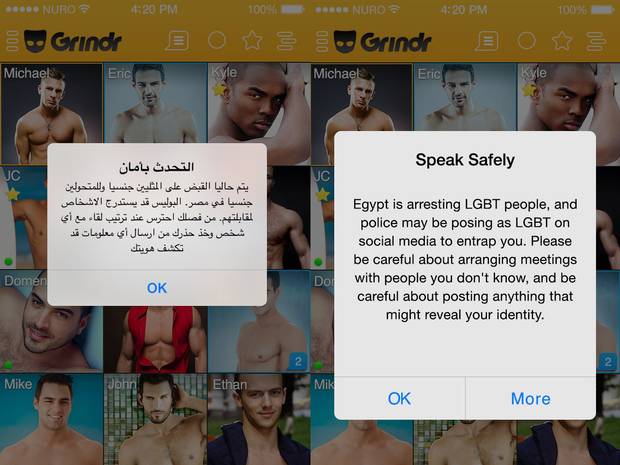>> Grindr urges LGBT community to hide their identities as Egypt persecutes nation’s gay community
« L’Egypte arrête des personnes LGBT, et la police peut se faire passer pour une personne LGBT afin de vous piéger.
Veuillez être prudent lorsque vous prévoyez de rencontrer une personne que vous ne connaissez pas et soyez vigilant si vous publiez quelque chose qui pourrait révéler votre identité. »
C’est le message qui s’est affiché sur le téléphone des utilisateurs égyptiens de Grindr (le réseau homosexuel qui permet de géolocaliser des partenaires masculins possibles et disponibles). Si l’homosexualité n’est pas un délit en Egypte, les homosexuels sont régulièrement arrêtés et mis en prison pour immoralité, débauche ou atteinte à la religion.
Le message de Grindr à ses utilisateurs fait suite à des articles parus dernièrement dans la presse égyptienne et relatant des arrestations. Six hommes viennent en effet d’être condamnés à deux ans de prison et de travaux forcés. Sur Facebook, ils avaient proposé de louer leur appartement à des hommes pour qu’ils puissent y avoir des relations sexuelles.
Grindr avait alors été critiqué pour ne pas protéger assez ses utilisateurs. En réaction, Grindr a communiqué :
« Tout utilisateur qui se connectera à Grindr dans ces pays [aux lois homophobes, ndlr] sera, par défaut, immédiatement impossible à localiser, ce qui inclut la Russie, l’Egypte, l’Arabie saoudite, le Nigeria, le Liberia, le Soudan et le Zimbabwe. Il y a encore d’autres pays déjà concernés par cette mise à jour sur la question des localisations, et on continuera d’en ajouter à cette liste. »
>> Grindr has warned users to hide their identities on social media following the arrests of scores of gay men and fears Egyptian police are using the social network to seek out members of the country’s LGBT community.
“Egypt is arresting LGBT people and police may be posing as LGBT on social media to entrap you,” Grindr warned users in an on screen message.
“Please be careful about arranging meetings with people you don’t know and be careful about posting anything that might reveal your identity.”
In what may be the first case of Egyptians being charged on the basis of evidence gathered online, six men were sentenced yesterday to two years of jail-time and hard labour after advertising their apartment as a place for gay men to have sex on Facebook.
Egyptian state media said the men had been caught “red-handed” in “committing debauchery”. Homosexuality is not explicitly illegal in Egypt but in the deeply conservative nation members of the LGBT community have been routinely charged with immorality, debauchery and contempt of religion and then jailed for their sexuality.
Grindr had faced criticism over the potential infiltration by Egyptian state security and has said it is “taking proactive measures to keep users safe in territories with a history of violence against the gay community.
“Any user who connects to Grindr in these countries will have their distance hidden automatically by default, which include Russia, Egypt, Saudi Arabia, Nigeria, Liberia, Sudan and Zimbabwe. There are many more countries already being protected by this location change, and we will continue to add more to this list.”
#stopjailinggays Egyptian police have a very bad history regarding homosexual rights pic.twitter.com/QdaJhBPxTs
— مثلي لاديني (@agnosticgay) September 25, 2014
Egypt has stepped up its prosecution of homosexuals over the last year, following the ouster of the country’s first democratically elected president Mohammed Morsi. Activists say as many as 80 people have been arrested in the well-publicised cases.
Eight men are currently standing trial for appearing in a video which went viral in Egypt showing two men exchanging rings at an alleged gay marriage ceremony. They face three years in prison.
In 2001 more than 50 defendants were put on trial at once in the infamous “Queen Boat Trial”.
The US NGO Human Rights Watch has said Egyptian authorities have routinely arrested, tortured and detained men suspected of consensual homosexual conduct. It said the arrests “reflect the Egyptian government’s growing disdain for the rule of law.”


















